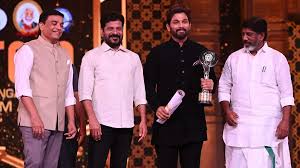Row over Telangana Film Awards named after Gaddar as BJP, Cong trade fireworks

The Telangana government’s decision to revive its state film awards and name them after revolutionary poet Gaddar has set off a heated political storm. While the move gained support from cultural groups and progressive voices, it triggered fierce opposition from the Bharatiya Janata Party (BJP). The Congress, now in power in the state, has defended the move as a tribute to a legendary figure.
Gaddar’s Legacy and the State’s Decision
The awards, paused since 2017, are now back under a new title—the Gaddar State Film Awards. Cultural Minister Jupally Krishna Rao announced the revival, calling Gaddar “the soul of Telangana.” He said that Gaddar’s songs and poetry played a vital role in the separate statehood movement and inspired generations.
Born as Gummadi Vittal Rao, Gaddar was more than a performer. His powerful songs reached farmers, students, and workers. His ballads gave voice to the voiceless and pushed the Telangana identity to the forefront.
By naming the awards after him, the Congress government hopes to recognize his deep cultural and emotional connection with the people.
BJP Slams the Move
The BJP quickly reacted with sharp criticism. Union Minister G. Kishan Reddy accused the Congress of “misusing culture for political gain.” He said Gaddar’s past links with leftist movements, including Maoist ideologies, made him unfit for this honor.
“Art and culture should unite people, not divide them along ideology. The Congress is trying to glorify someone who once supported armed struggle,” Reddy said during a press conference in Hyderabad.
The BJP also argued that Telugu cinema had many iconic figures deserving of such recognition. “Why not name the awards after NT Rama Rao or B. Narsing Rao?” a party spokesperson asked.
Congress Defends Its Choice
The Congress hit back, accusing the BJP of fearing cultural voices that empower the marginalized. Telangana Pradesh Congress Committee (TPCC) chief Revanth Reddy defended the move, saying that Gaddar stood for justice, equality, and people’s rights.
“Gaddar gave up armed struggle years ago and joined democratic movements. His transformation is proof of his commitment to peace and justice,” Reddy said.
He added that the BJP always feels threatened by people who don’t align with its ideology. “They don’t like it when voices from the ground get recognition,” he said.
Mixed Reactions from the Film and Art Community
Within the film industry and cultural circles, reactions were mixed. Some praised the government’s decision as bold and inclusive. Renowned director Tharun Bhascker said Gaddar’s influence on art and society made the decision meaningful.
“His songs shaped movements. His voice reached villages and cities alike. Naming the awards after him gives the event a powerful message,” Bhascker said.
However, others questioned whether a cinema award should bear the name of someone who didn’t directly work in the film industry. One senior producer said, “He wasn’t a filmmaker. This should have been a separate award for literature or revolutionary music.”
Public Reactions and Symbolism
On social media and in public forums, the announcement stirred debate. Supporters praised the Congress for honoring grassroots icons. Critics accused it of deflecting attention from real issues.
Some citizens welcomed the idea of linking culture with social values. Others worried that politicizing awards could harm their credibility.
Observers say the Congress may be trying to connect with rural and underrepresented communities ahead of local elections. Gaddar’s legacy holds deep emotional value in Telangana’s villages and working-class areas.
By naming the awards after him, the Congress could strengthen its image as a party of the people.
A Deeper Debate: Who Defines Culture?
This controversy goes beyond names and awards. It highlights an ongoing debate in Indian politics—who decides which icons represent culture? Should recognition be based on popularity, ideology, or impact?
For many, Gaddar’s role as a poet of the people outweighs his political past. His songs continue to be used in plays, movies, and protests. They shaped the Telangana narrative more deeply than many mainstream artists.
The BJP, on the other hand, insists that state-sponsored honors must reflect neutral values. They argue that honoring Gaddar could alienate sections of the public.
Both sides agree on one thing—culture is powerful, and symbols matter.
What Lies Ahead?
The Telangana Film Awards ceremony will take place later this year. Whether the name sparks more clashes or wins hearts remains to be seen. For now, the Congress is standing firm.
The episode serves as a reminder that culture, like politics, is always contested. By choosing Gaddar, the state has made a statement. Whether it unites or divides, only time will tell.






